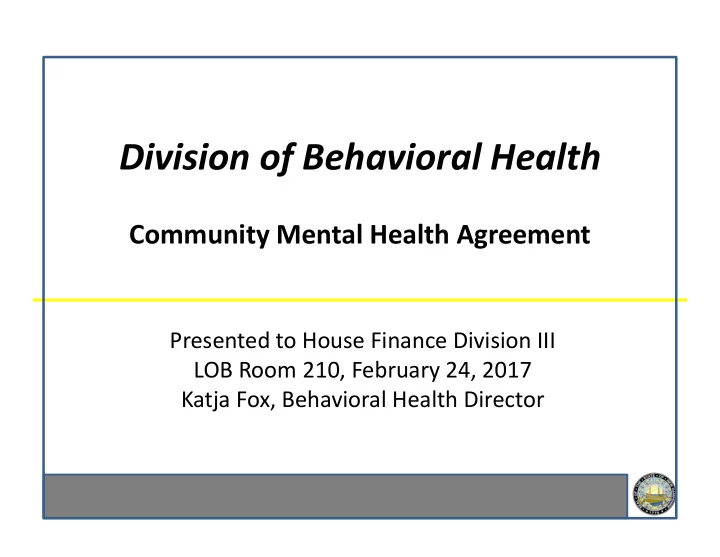

Division of Behavioral Health Community Mental Health Agreement Presented to House Finance Division III LOB Room 210, February 24, 2017 Katja Fox, Behavioral Health Director
Background 1990 Americans with Disabilities Act (ADA) adopted. 1999 US Supreme Court rules in Olmstead v. L.C.: that the ADA requires services be provided in least restrictive setting. 2010-2011 US Department of Justice (US DOJ) investigates State compliance with Olmstead; NH Disability Rights Center investigates. Separate findings issued. 2012 Class action complaint filed alleging State’s administration of mental health system violates rights of individuals with Serious Mental Illness under the ADA. 2014 Court approves CMHA. Implementation and funding supports commenced. Expert Reviewer on-boarded. 2
Major Components Crisis Services System, incl. Mobile Crisis Teams • Assertive Community Treatment (ACT) • Supported Housing • Community Residences • Supported Employment • Family & Peer Supports • Transition Process • Quality Assurance and Performance Improvement • 3
Crisis Services System Two components: • Maintain existing crisis services system statewide – Create 3 Mobile Crisis Teams w/4 crisis apartment beds – Location FY 2018 FY 2019 Concord (6/30/15) $1,398,316 $1,398,316 - Fully operational; 4 beds Manchester (6/30/16) $1,345,249 $1,345,249 - Team operational; 2 beds Nashua (6/30/17) $1,313,813 $1,313,813 - In procurement CMHA Total $4,057,378 $4,057,378 Medicaid $1,467,300 $1,467,300
Assertive Community Treatment Two components: • Ensure existing 11 ACT Teams compliant, at least 1/region – Achieve ACT capacity goals: (# served -- # teams) – 1,300 (13 teams) by 6/30/15 • Current: 1,162 (12 teams) 1,500 (15 teams) by 6/30/17 • FY18 FY19 Traditional CMHA Traditional CMHA Teams 1-11 $1,224,000 $1,281,000 $1,224,000 $1,281,000 Team 12 $225,000 $225,000 Team 13-15 (to $675,000 $675,000 be developed) Total $3,405,000 $3,405,000 Medicaid $10,605,100 $10,605,100
Supported Housing Two components: • Includes coupling services (ACT, Case Management), and housing specialists – assistance to maintain individual in integrated setting with affordable housing Achieve specified number of units: – By 6/30/14 – 240 • By 12/31/14 – 290 • Current -- 686 By 6/30/15 – 340 • By 6/30/16 – 450 • By 6/30/17 -- 600 • FY18 FY19 Traditional CMHA Traditional CMHA Housing Bridge Subsidy $1,923,160 $2,289,000 $1,923,160 $2,289,000 Program Total $4,212,160 $3,405,000
Community Residences Have capacity to serve individuals in community • with mental illness and complex health care needs – Achieve capacity to serve individuals: By 6/30/15 – 4 • Current -- 10 By 6/30/16 – 10 • By 6/30/17 -- 16 • FY18 FY19 CMHA CMHA Glencliff Home Transition to $900,000 $900,000 Community Residence
Other Components Supported Employment • Incremental increases in statewide penetration rate, to final – requirement of 18.6% Family and Peer Supports • Statewide network – Transition Process • Glencliff Home and New Hampshire Hospital focused – Quality Assurance and Performance Improvement • Quality Service Reviews (QSR) – Fidelity Reviews for Evidence Based Practices (ACT and SE) – Current Status -- In compliance
CMHA Summary FY18 FY19 Traditional CMHA Medicaid Traditional CMHA Medicaid Mobile Crisis $ 0 $4,057,378 $1,467,300 $ 0 $4,057,378 $1,467,300 ACT $1,224,000 $2,181,000 $10,605,100 $1,224,000 $2,181,000 $10,605,100 Supported $1,923,160 $2,289,000 $ 0 $1,923,160 $2,289,000 $ 0 Housing Community $ 0 $900,000 $ 0 $ 0 $900,000 $ 0 Residences Supported $ 0 $ 0 $5,250,000 $ 0 $ 0 $5,250,000 Employment Total $3,147,160 $9,427,378 $12,072,400 $3,147,160 $9,427,378 $12,072,400
Major Challenges Recruitment and retention of CMHC staff • Impacts achievement of ACT capacity goals – Impacts increases in SE penetration rates by region – Development of community residence 4-bed model • Need availability in multiple regions of state – Transitioning Glencliff Home residents (more • quickly) into CMHA compliant community setting Customized to individual/guardian preference – Regional provider/housing availability –
Recommend
More recommend